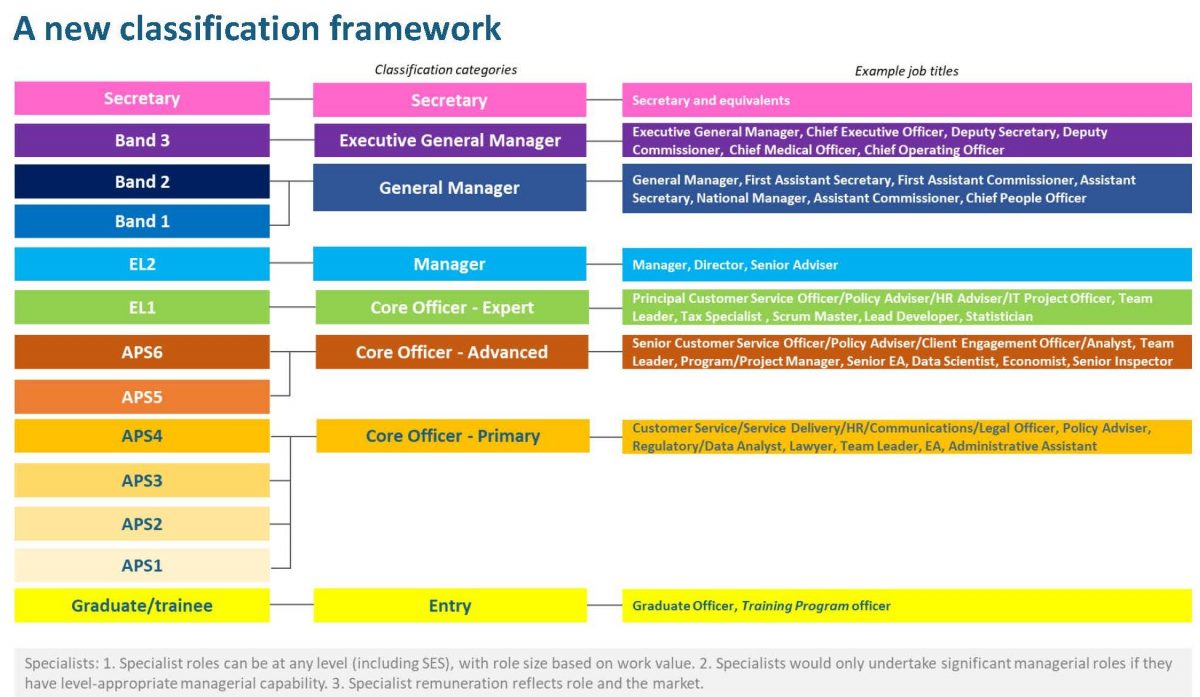
APS Commissioner Peter Woolcott will act on many of the review’s findings, but classifications will remain unchanged. Photo: APSC.
Sweeping changes to Australian Public Service employment classifications will not be happening anytime soon, despite an independent panel’s strong recommendation.
Australian Public Service Commissioner Peter Woolcott has released the much anticipated APS Hierarchy and Classification Review, saying he will act on many of its findings but will not change classifications at this stage.
Instead, a consultation period of undetermined length will start in November to further gauge the sentiment of staff and undertake a cost-benefit analysis of changing the classification rules.
The independent review panel, chaired by Professor Heather Smith, who has served as Secretary of the Department of Industry, Innovation and Science and the Department of Communications and the Arts, looked at how the APS could reduce hierarchy and make the best use of the capability and expertise of its workforce.
The first of the panel’s eight recommendations is to streamline the number of employment levels. Specifically, it recommended “modernising and simplifying the Public Service Classification Rules 2000 from 13 to 8 classifications, with Secretaries retaining the flexibility to structure their organisations to optimise business needs”.
The second recommendation is to refer to people’s roles with descriptive titles rather than numerical classifications.

The proposed APS classifications structure. Image: APSC.
If these first two recommendations are eventually adopted, classifications now known as APS1 through to APS4 would be merged into one category labelled as Core Officer – Primary.
APS5 and APS6 would become one classification called Core Officer – Advanced. Executive Level 1 would be known as Core Officer – Expert, and Executive Level 2 as Manager.
In the Senior Executive Service, Band 1 and Band 2 would merge to become General Manager, making Band 3 Executive General Manager.
“The panel makes a good case for its ambitious proposals around classification reform, but the timing and viability of such complex reform needs to be carefully weighed,” Mr Woolcott said.
“Any decision to proceed with classification reform in the future would need to be looked at further in consultation with staff, stakeholders and as part of the Government’s reform agenda.”
The Commissioner said there were other recommendations from the review that would receive immediate attention.
The APSC would take “measured steps” towards more modern structures.
“A key theme of the review is strengthening APS culture and capability, and we will begin our work there,” Mr Woolcott said.
“I strongly support the aspiration to modernise the way we operate in the APS, to better position ourselves to meet future challenges and provide more rewarding careers for our people.”
Other recommendations of the review go to areas of enabling progression through the ranks through fair and transparent assessment; recognising the value of specialists within the classification framework; and urgent investment in the capability of future leaders, including mandated management training.
EL2s would get special attention in the areas of people management and leadership training.
But while the APSC will embrace these areas, changing the classifications appears to be on the back burner.

Dr Heather Smith: the APS needs to offer flexibility. Photo: Supplied.
Dr Smith said she understood the need to get the culture right and to strengthen leadership inside the APS, but added that the classification structure was overdue for an overhaul.
“We stand by the recommendation. It is the first recommendation and it is there for a reason,” the panel chair said.
“I think when you look at history and how organisations have had to implement change, we would like to see that recommendation moved on.
“The APS hasn’t changed its structure in 30 years. You have a workforce that is demanding more flexibility and in order to attract and keep good people in today’s environment, you need to offer that flexibility.
“But yes, you can aim for the best structure you like, but without a strong culture and good leadership, you won’t get the structure you want.
“Our view is you need to build in the maximum agility.”
The ten-month review was initiated by the APSC in 2021 after the Thodey Review highlighted the areas of concern in 2019.
The eight recommendations are:
- Modernise and simplify the Public Service Classification Rules 2000 from 13 to 8 classifications, with Secretaries retaining flexibility to structure their organisations to optimise business needs.
- Refer to people’s roles by descriptive job titles, rather than numerical classifications.
- Enable progression for people within classifications through fair and transparent assessment driven by proficiency, skills development and workforce planning.
- Recognise specialists for the value of their work within the new classification framework.
- The Secretaries Board to implement spans of control for senior management roles generally within the range of 8-10 direct reports, consistent with contemporary organisational design.
- Invest urgently in the capability of future leaders, particularly the EL2/Manager cohort, and mandate management and leadership training for all staff with supervisory responsibility.
- Strengthen the role of the APS Commissioner as the Chief People Officer for APS people management.
- The Secretaries Board to adopt and model a Charter of Leadership Behaviours for APS leaders to promote collaborative and team-based behaviours.
Departmental secretaries have also released a new Charter of Leadership Behaviours. With the acronym DRIVE, the expected APS leadership traits are to be Dynamic and Respectful, have Integrity, Value others and Empower people.
“The expectations placed on APS managers continue to change and evolve as we respond to changing technology and more flexible ways of working,” Mr Woolcott said.
“So too we need to evolve our approach to growing and supporting managers as they adapt to new ways of working.”


















